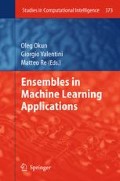Abstract
This paper considers the use of Random Oracles in Ensembles for regression tasks. A Random Oracle model (Kuncheva and Rodríguez, 2007) consists of a pair of models and a fixed randomly created “oracle” (in the case of the Linear Random Oracle, it is a hyperplane that divides the dataset in two during training and, once the ensemble is trained, decides which model to use). They can be used as the base model for any ensemble method. Previously, they have been used for classification. Here, the use of Random Oracles for regression is studied using 61 datasets, Regression Trees as base models and several ensemble methods: Bagging , Random Subspaces, AdaBoost.R2 and Iterated Bagging. For all the considered methods and variants, ensembles with Random Oracles are better than the corresponding version without the Oracles.
This work was supported by the Project TIN2008-03151 of the Spanish Ministry of Education and Science.
Access this chapter
Tax calculation will be finalised at checkout
Purchases are for personal use only
Preview
Unable to display preview. Download preview PDF.
References
Breiman, L.: Bagging predictors. Machine Learning 24, 123–140 (1996)
Breiman, L.: Using iterated bagging to Debias regressions. Machine Learning 45, 261–277 (2001)
Demšar, J.: Statistical comparisons of classifiers over multiple data sets. J. Machine Learning Research 7, 1–30 (2006)
Dietterich, T.G.: Approximate statistical test for comparing supervised classification learning algorithms. Neural Comp. 10, 1895–1923 (1998)
Drucker, H.: Improving regressors using boosting techniques. In: Fisher, D.H. (ed.) Proc. the 14th Int. Conf. Machine Learning, Nashville, TN, pp. 107–115. Morgan Kaufmann, San Francisco (1997)
Elomaa, T., Kääriäinen, M.: An analysis of reduced error pruning. J. Artif. Intell. Research 15, 163–187 (2001)
Freund, Y., Schapire, R.E.: Experiments with a new boosting algorithm. In: Saitta, L. (ed.) Proc. the 13th Int. Conf. Machine Learning, Bari, Italy, pp. 148–156. Morgan Kaufmann, San Francisco (1996)
Freund, Y., Schapire, R.E.: A decision-theoretic generalization of on-line learning and an application to boosting. J. Comp. and Syst. Sciences 55, 119–139 (1997)
Hall, M., Frank, E., Holmes, G., Pfahringer, B., Reutemann, P., Witten, I.H.: The WEKA data mining software: An update. SIGKDD Explorations 11, 10–18 (2009)
Ho, T.K.: The random subspace method for constructing decision forests. IEEE Trans. Pattern Analysis and Machine Intell. 20, 832–844 (1998)
Kuncheva, L.I., Whitaker, C.J.: Measures of diversity in classifier ensembles. Machine Learning 51, 181–207 (2003)
Kuncheva, L.I.: Combining pattern classifiers: Methods and algorithms. John Wiley & Sons, Hoboken (2004)
Kuncheva, L.I., Rodríguez, J.J.: Classifier ensembles with a random linear oracle. IEEE Trans. Knowledge and Data Engineering 19, 500–508 (2007)
Margineantu, D.D., Dietterich, T.G.: Pruning adaptive boosting. In: Fisher, D.H. (ed.) Proc. 14th Int. Conf. Machine Learning, Nashville, TN, pp. 211–218. Morgan Kaufmann, San Francisco (1997)
Rodríguez, J.J., García-Osorio, C., Maudes, J.: Forests of nested dichotomies. Pattern Recognition Letters 31, 125–132 (2010)
Shrestha, D.L., Solomatine, D.P.: Experiments with AdaBoost.RT: An improved boosting scheme for regression. Neural Comp. 18, 1678–1710 (2006)
Suen, Y., Melville, P., Mooney, R.: Combining bias and variance reduction techniques for regression trees. In: Gama, J., Camacho, R., Brazdil, P.B., Jorge, A.M., Torgo, L. (eds.) ECML 2005. LNCS (LNAI), vol. 3720, pp. 741–749. Springer, Heidelberg (2005)
Wang, Y., Witten, I.H.: Induction of model trees for predicting continuous classes. In: van Someren, M., Widmer, G. (eds.) ECML 1997. LNCS, vol. 1224, pp. 128–137. Springer, Heidelberg (1997)
Witten, I.H., Frank, E.: Data mining: Practical machine learning tools and techniques. Morgan Kaufmann, San Francisco (2005)
Zhang, C., Zhang, J., Wang, G.: An empirical study of using Rotation Forest to improve regressors. Applied Mathematics and Comp. 195, 618–629 (2008)
Author information
Authors and Affiliations
Editor information
Editors and Affiliations
Rights and permissions
Copyright information
© 2011 Springer-Verlag Berlin Heidelberg
About this chapter
Cite this chapter
Pardo, C., Rodríguez, J.J., Díez-Pastor, J.F., García-Osorio, C. (2011). Random Oracles for Regression Ensembles. In: Okun, O., Valentini, G., Re, M. (eds) Ensembles in Machine Learning Applications. Studies in Computational Intelligence, vol 373. Springer, Berlin, Heidelberg. https://doi.org/10.1007/978-3-642-22910-7_11
Download citation
DOI: https://doi.org/10.1007/978-3-642-22910-7_11
Publisher Name: Springer, Berlin, Heidelberg
Print ISBN: 978-3-642-22909-1
Online ISBN: 978-3-642-22910-7
eBook Packages: EngineeringEngineering (R0)

